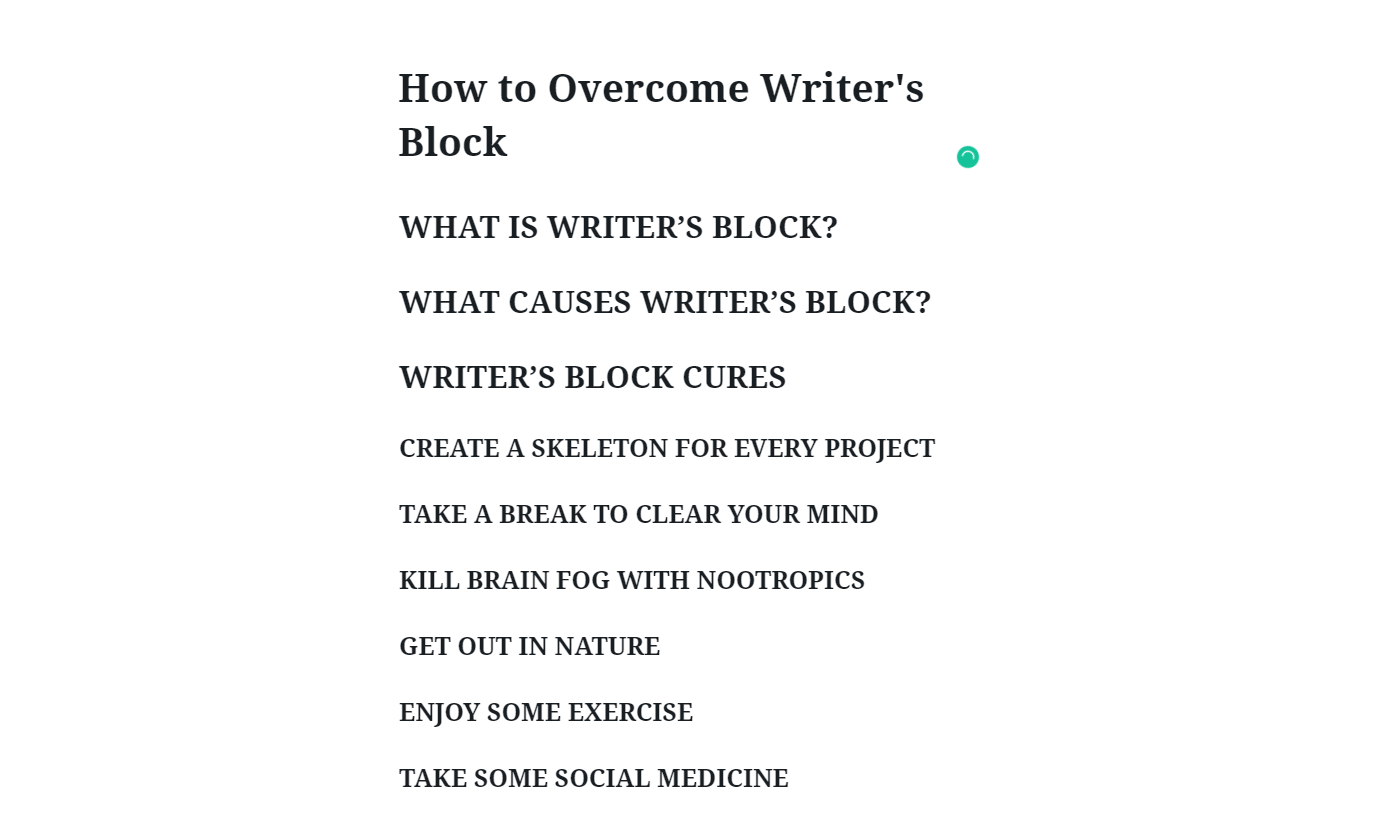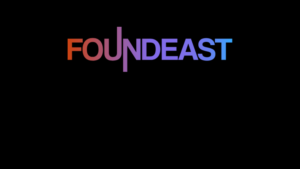We’ve all been there.
You’re typing away and writing one of the best pieces of copy in the history of the world.
Then it happens.
Yes, it.
It being writer’s block.
Every writer will experience a mental block at some point whether they’re writing a blog post, book, or any other material.
You have trouble forming sentences and thinking of the next big idea when you hit this mental block.
I write thousands of words every day for my businesses and clients. Yet I never hit writer’s block.
Want to learn my secrets?
Keep reading.
What is writer’s block?
Writer’s block is the phenomena of writing and hitting a mental block that stops you from coming up with new words, sentences, ideas, and content.
It can be very frustrating especially when you’re writing content for a client, school, work, or another party where there are deadlines and more pressure.
Every writer will experience it at some point. It’s completely normal.
However, it’s also completely avoidable.
Let me explain.
What causes writer’s block?
There is no one reason that someone will experience writer’s block.
It could be a single reason or a combination of different ones.
The key is to address what’s causing your individual case of writer’s block and fixing those issues.
In general, writer’s block is caused by:
- Not taking enough breaks to reset your brain.
- A lack of energy from too much caffeine, too little of exercise, or a poor diet.
- Not getting adequate sleep which results in lethargy.
- Trying to complete projects with little to no guidelines or planning.
- Pressure from deadlines, clients, yourself, or other individuals.
Maybe you relate to some of these, maybe you don’t. Either way, here are effective ways to overcome writer’s block instantly.
Writer’s block cures
These are some of the most effective ways to get past writer’s block if you’re stumped for ideas and inspiration.
I write three to five thousand words per day across client projects and my businesses, and I can genuinely say that I never get writer’s block thanks to these methods.
Enjoy 🙂
1. Create a skeleton for every project
One strategy I wish I learned in my early days as a copywriter which would’ve saved me an insane amount of hours is planning out my projects.
How many times have you stared at a white screen or blank piece of paper trying to write the first thing that comes to your mind?
I’ve done it way too many times, but I learned over time that it was contributing to my writer’s block.
You can speed up how fast you complete projects and avoid any mental blocking by simpling creating a skeleton of the task.
Let’s use this blog post you’re reading right now as an example.
I planned out all of the headers before I began writing like this:

This way when I begin writing I know exactly what to write about next instead of sitting there dumbfounded coming up with another point.
Using this approach will transform any writer’s life because most mental blocks come from trying to up with new ideas on the spot.
You can save mountains of energy and time by simply planning out whatever you’re writing ahead of time.
While it will vary slightly depending on the exact material you’re producing, I recommend taking the following steps:
- Plan out every header, section, or chapter.
- Map out any subheaders and subsections under each of the above.
- Collect resources and references like whitepapers, studies, blog posts, and other useful material to source as you write.
- Enjoy no more writer’s block!
2. Take a break to clear your mind
Science has proven that taking breaks are needed to refresh your brain and stay productive in the long term.
Strangely enough, it has been found that the longer you give attention to a single project, the fewer resources your brain allocates towards it.
This is because our brains are hardwired to tackle quick tasks and move onto the next thing.
However, it doesn’t work like that in the real world. Maybe back when we were cavemen, but not today.
What can you do to combat this? By taking strategic breaks.
And no, I’m not talking about watching Netflix for three hours.
I’m talking about going for a quick walk, grabbing a coffee, reading a book, or browsing social media.
While I always advocate that you should take productive breaks, it’s okay to lounge a bit before getting back to work if you’re getting a lot done.
3. Kill brain fog with nootropics
I’m all about health and fitness, so naturally, I found my way into brain supplements.
Nootropics are supplements that boost focus, attention, memory, and other cognitive abilities.
I strongly believe that all entrepreneurs and people that work long hours should at least try them.
You can buy them off of Amazon and many other online stores. They are safe, effective, and many have decades of research to back them up.
I would recommend trying the following nootropics by themselves or in combinations:
- 5-HTP: This is 5-hydroxytryptophan which converts into serotonin. It offers many benefits including better mood, sleep, and memory.
- Green tea extract: Nowadays I just drink cups of green tea, but I did enjoy taking the extract version in the past. It has many antioxidants like EGCG and L-theanine which relax you while improving focus and reducing inflammation.
- Choline: Your body already produces choline, but unfortunately not enough to keep your brain and body in top condition. Taking choline as a supplement supports all of the nerves in your body, promotes DNA synthesis, and issued to make the neurotransmitter acetylcholine.
- Lion’s mane mushroom: This is one of the healthiest mushrooms you can consume because of its ability to conduct neurogenesis. That means it literally builds new brain cells and pathways.
- Rhodiola: This Indian flower has stimulating properties that make it a perfect partner with caffeine or L-theanine.
4. Get out in nature
I love taking breaks from business projects to go for a hike, run, or bike ride through nature trails.
There’s something about the booming sea of green, earthy browns, and crystal blue sky that feels amazing to bask in.
I always feel very refreshed when I get out in nature and come back to work.
Research if there are any local nature trails, hiking paths, or similar areas you can frequent for breaks. Even a quick stroll in these places will make you feel awesome before resuming projects.
5. Enjoy some exercise
Regular exercise has been proven to boost memory and cognitive abilities.
How do you think our brains grew so much through evolution?
By moving!
Blood filled up various parts of the brain, providing oxygen and nutrients for it grow.
It should be no surprise that writers can reap similar benefits on a daily basis by moving more often.
I personally love weightlifting, yoga, hiking, and running. These are a lot of fun and you can do them with friends to mix in some social time, too.
The hippocampus specifically is the most stimulated part of the brain when you exercise.

In fact, a study from 2011 discovered that exercise is capable of growing the hippocampus by 2% and reversing one to two years worth of age-related loss in this area.
You don’t have to be a crazy health freak, either. All you need to do is be active at least a few times per week.
Exercising also means that you will have more energy and focus throughout the day to put into writing projects.
6. Take some social medicine
Spending time with positive and uplifting people is called social medicine in psychology.
I love making time to spend time with my friends to do productive and healthy activities in between big projects.
We commonly work out, hike, play golf, make music, and do other fun things together.
Not only are many of these things great for your body and mind, but it allows you to relax and take your mind off of business.
Heck, grabbing a cup of coffee and having a nice conversation is still great social medicine.
Just because you grind 16 hours per day on your company doesn’t mean you should neglect a healthy social life.
Watch this video from Gary Vaynerchuk on balancing work and life to understand what I mean:
And if you’re a big fan of Gary like I am, make sure to read my previous article on 9 life-changing paradigms from Gary Vaynerchuk.
7. Switch up your environment
I don’t know about you, but I can’t sit in one place for too long!
I start itching to see new things, people, and be in a new environment.
Try changing up your work environment if you feel this way.
Some days I work from home while others I spend at coffee shops or nearby campuses, for example.
College campuses are awesome because the whole energy is about productivity and getting things done.
There’s also a degree of accountability when you leave the house to work because you’re dedicating your time to go elsewhere.
8. Remove any distractions
Phones, televisions, and social media are a lot of fun but damn can they waste a lot of time, too.
Be honest.
How much time have you spent tabbing over to Facebook or scrolling through Instagram instead of writing?
I believe that some cases of writer’s block stem from distractions because you’re not giving projects your full attention.
Constantly checking social networks or looking over at the television will break your train of thought and any momentum you’ve created.
That’s why my last tip for overcoming writer’s block would be to remove any distractions when you’re working.
Check your phone or social media when you take a strategic break afterward instead.
Overall, writer’s block is something you’re bound to experience especially when you’re new to copywriting of any sort.
The best thing you can do to avoid it is planning out your projects. This ensures that you know exactly what you’re writing ahead of time.
Taking breaks to get out in nature, exercise, see friends, and pursue hobbies is also key to refreshing your brain.
Try taking nootropics if you need an extra boost in mental energy, as well.
It’s also very important that you remove any distractions that are slowing you down and potentially worsening writer’s block to begin with.
9. Avoid using superlatives
A superlative is an exaggeration or hyperbole commonly used in writing.
Unfortunately, it cuts your creativity and workflow in half when you use them.
This is because you don’t have to think harder about what to replace the superlative with. Here are two examples:
- With a superlative: That is the fastest Lamborghini.
- Without a superlative: That Lamborghini is able to achieve 0-60/mph in less than three seconds because it has a 12 cylinder engine.
See what I mean?
A superlative will sum up a sentence or two which is not what you want to use when hitting writer’s block.
You want as much inspiration and ideas, right?
That’s why I recommend you go back through your writing and check for superlatives. Replace these will better explanations and your writer’s block will melt away!
10. Share your writing with friends and family
One of my favorite practices as a copywriter is to share my content and projects with friends to get their input.
It doesn’t matter if your friends or family aren’t seasoned writers themselves. They may notice things that you don’t which will become helpful in improving the finished product.
Ask for their ideas and input. Often you will find that their suggestions give you some brain food that helps you get over writer’s block.
Final thoughts on breaking writers block
It doesn’t matter if you’re a direct response copywriter, student, or hobbyist.
You will hit writer’s block at some point.
And I know. It can be disappointing and frustrating when you can’t come up with ideas. However, there are things you can do to deal with writer’s block effectively.
Apply these main takeaways below and watch how much of a better writer you become!
- Create an outline for every project you begin so you know what you’re writing ahead of time.
- Learn to take short productive breaks when working for long hours as it resets the brain and makes you feel refreshed when you return to writing.
- Try taking nootropics. These brain supplements help with focus, memory, and learning.
- Go for a walk in nature or get some sun. You’d be surprised how great this makes you feel and resets your brain.
- Exercise on a regular basis as this promotes blood flow to the brain
and is the main way our brain grew during evolution. - Hang out with friends and family. It’s nice to have some downtime and recieve motivation from those around you. Similarly, ask for their feedback and input on projects.
- Switch up where you work if possible. I like working from home, cafes, and campuses, for examples.
- Remove distractions like your phone, social media, or television if you believe it’s cutting into your focus.
- Avoid using superlatives as they stunt your creativity and deeper thinking.














